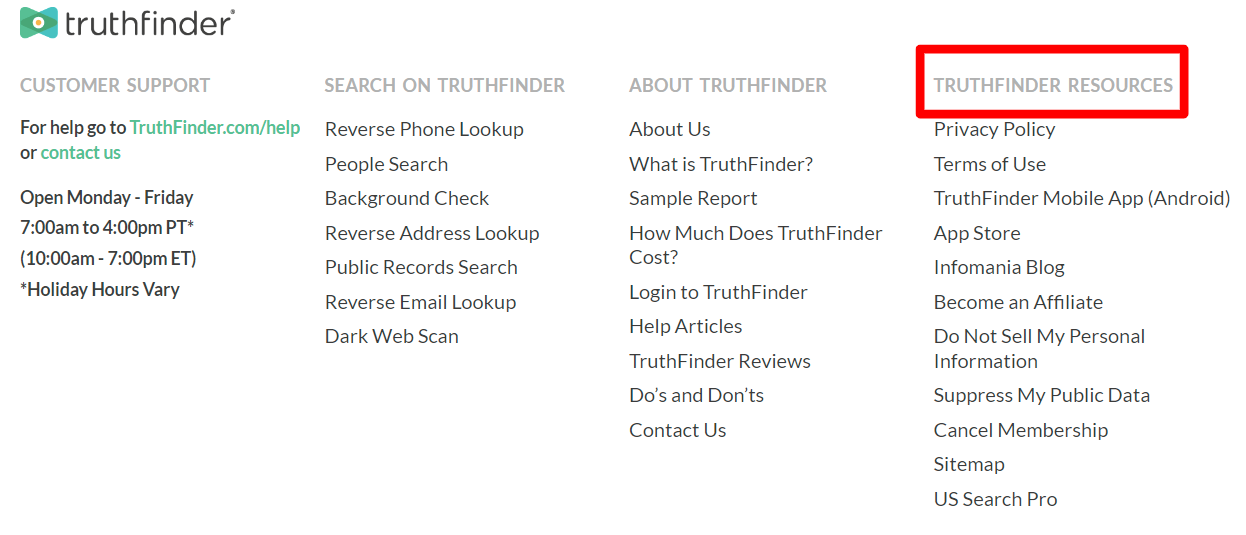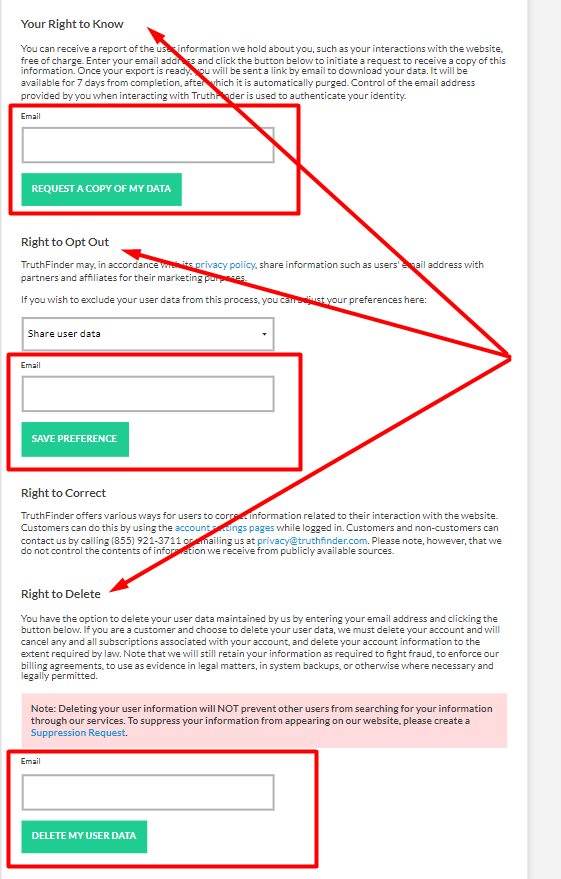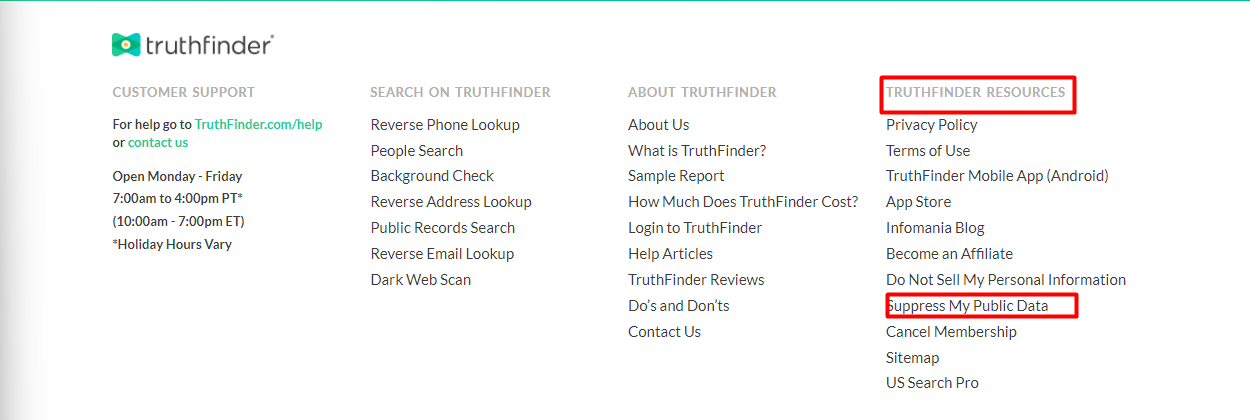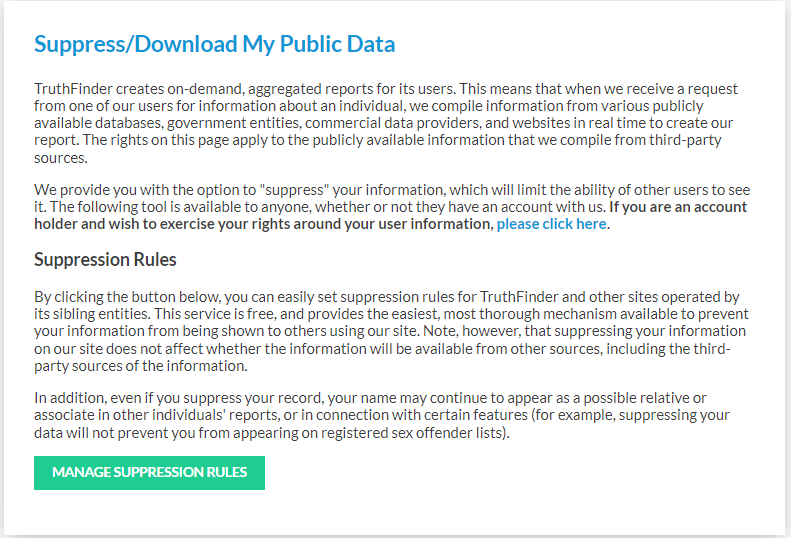If you are searching for this assistance, you likely have discovered some of your personal information being shared on TruthFinder (which aggregates data from various public sources). If you prefer to not have that info easily obtainable, there is a way to suppress it.
However, you should know that removing data from a single source likely won’t do you much good. That’s because TruthFinder is just one piece of a much larger footprint that affects millions of people.
Consider the following:
- According to PrivacyRights.org, there are over 500 Data Brokers in the US alone, and an estimated 4,000 globally [1].
- Most people have had their data leaked more than once. In 2022, over 422 million records were leaked, a 42% increase from the previous year, according to the Identity Theft Resource Center (ITRC) [2].
Step-by-Step Guide for TruthFinder
TruthFinder has a few different options for managing, removing, and opting out of their website. We’re going to go over all of them in this section.
First, head over to TruthFinder.com, scroll down to the end of the page. You should see four columns: Customer Support, Search on TruthFinder, About TruthFinder, and TruthFinder Resources.

Everything we’re going to be doing is under TruthFinder Resources.
We must take several steps, so please read carefully and follow directions.
Step 1: “Do Not Sell My Personal Information”
First, find the section “Do Not Sell My Personal Information” under the TruthFinder Resources column.
After opening the page, you will see six subsections, but we are only concerned with three:
- “Your Right to Know”: If you want to receive a report about the information TruthFinder has on you. It is available for seven days following completion. This step does not delete your info.
- “Right to Opt Out”: To control the information TruthFinder shares with “partners and affiliates.” This step does not delete your info. This step requires that you hit the drop-down arrow and select “DO Not Share user data.”
- “Right to Delete”: To remove your data from TruthFinder. While this step deletes your info, it DOES NOT stop others from searching for your information.

Confirm your choices by entering your email address and clicking the appropriate button.
Step 2: “Suppress My Public Data”
Predictably, TruthFinder requires another step if you wish to stop sharing your info.
This step is called “Suppress My Public Data,” under the same “TruthFinder Resources” section on the TruthFinder homepage.


Don’t be intimidated by the amount of text on the page. Here’s a rundown of what each paragraph says in case you’re interested:
Paragraph 1: How TruthFinder collects your information.
Paragraph 2: Explanation of the suppression tool
Under “Suppression Rules”…
Paragraph 3: Limitations of the suppression tool, mainly that your info will still be available on the third-party sites where TruthFinder found the information.
Paragraph 4: Other limitations, including the possibility that your info remains as a relative or known associate on others’ records.
What is TruthFinder?
As of this writing, it is estimated that TruthFinder holds over 750 million records.
TruthFinder is a People Search Site, a kind of Data Broker that allows anyone to find anyone else using their name.
Besides forking over your info to someone you may or may not know, they’ll create an “on-demand, aggregated report” for anyone. They’ll even work with other Data Brokers in compiling the report.
Per the company’s website:
“Truthfinder creates on-demand, aggregated reports for its users … when we receive a request … for information about an individual, we compile information from … publicly available databases, government entities, commercial data providers, and websites in real time…”
Along with People Search Now, Spokeo, and Intelius, TruthFinder is one of the largest People Search Sites in the world. As of this writing, it is TruthFinder holds approximately 750 million records.
Information Collected by TruthFinder
The information collected by TruthFinder includes:
- Personal information: Name, age, date of birth, aliases, phone numbers, email addresses, physical addresses, and social media profiles.
- Criminal records: Arrest records, court records, felony records, misdemeanor records, and sex offender records.
- Marriage and divorce records: Marriage records, divorce records, and other records related to marital status.
- Property records: Property ownership records, property tax records, and other records related to real estate.
- Financial records: Bankruptcies, liens, judgments, and other financial documents.
- Professional records: Employment history, business affiliations, and other professional records.
- Education records: School records, degrees, and other educational information.
- Social media records: All personal information, including interests, relationships, demographics, and other data the account holder has posted.
- Miscellaneous data (per the company’s advertising): Graphic photos, dating websites, etc.
The Massive Problem of Data Brokers
Data Brokers collect and sell massive amounts of personally identifiable information (PII) to third parties. Exposed PII is a key part of most attacks that result in identity theft, financial fraud, and other cybercrimes.
In fact, experts widely consider Data Brokers a threat to privacy, even national security. Despite this threat, little is known about this $250+ billion industry [3]. That’s because, amazingly, Data Brokers operate in an environment with little to no oversight.
More incredibly (almost to the point of being funny), Data Brokers break the law a lot.
Here are just a few of their misdeeds:
- Failure to adequately protect personal data, resulting in data breaches and unauthorized information access
- Failure to comply with data privacy regulations, such as the GDPR and CCPA
- Failure to delete personal data when requested by users, as required by specific data protection laws.
- Illegally obtaining personal data from non-private entities
- Knowingly selling private data to criminals and other illicit actors, including on the black market
- Misusing personal data, including failing to get consent to collect data and failing to notify users of data breaches
Further, Data Brokers are known to sell highly sensitive PII and other information, including:
- Credit card numbers
- Bank account numbers
- Financial transactions and credit card information
- Geolocation data and GPS tracking information
- Health records and medical history
- Online browsing history
- Sexual orientation and preferences
- Text message history
- Web search history
How Can I Automatically Remove My Private Information From The Internet?
Exposed personal information is the root cause of identity theft, spam calls, paper junk mail, and stalking.
Privacy Bee removes your personal information from over 440+ Data Brokers (more than any other service) and custom removes data from 164,000+ additional custom sites.
Take back control of your privacy. Prevent identity theft, spam calls, and stalking for good.
Over a million people use Privacy Bee to automatically erase exposed phone numbers, addresses, and other personal data.
Click here to get a 100% FREE digital footprint scan.
See what sites have your information posted and start locking down your privacy today.
References
[1] PrivacyRights.org. (2021). Registered Data Brokers in the United States. Retrieved from https://privacyrights.org/resources/registered-data-brokers-united-states-2021
[2] Identity Theft Resource Center. (2023). 2022 Data Breach Report. Retrieved from https://www.idtheftcenter.org/post/2022-annual-data-breach-report-reveals-near-record-number-compromises/
[3] Maximize Market Research. (2022). Data Broker Market: Global Industry Forecast (2022-2029). Retrieved from https://www.maximizemarketresearch.com/market-report/global-data-broker-market/55670/











